

Taleb Rifai and David Scowsill together again: AIRBNB loves it
The world travel and tourism dream team Taleb Rifai and David Scowsill are back together.
Both men became good friends and worked together constantly for many years when Dr. Taleb Rifai was the UNWTO Secretary-General, and David Scowsill the CEO of WTTC.
This time, both men joined the Tourism Advisory Board of AIRBNB.
Also, today, the current UNWTO Secretary-General Zurab Pololikashvili and WTTC CEO Guevara Manzo pledged their support for each other at a press conference in Buenos Aires.
Zurab laid out recent developments for cooperation in Latin America. This was echoed with a billion-dollar cooperation in the private tourism industry reported by Gloria from WTTC. The winner seems to be Argentina tourism, the host of the ongoing WTTC Summit.
Many of the major or not so major hotels and hotel operators think AIRBNB is operating in the shadow of legality and are taking their business. Tax authorities around the globe are giving AIRBNB a hard time, but the online platform is doing fantastic and many travelers love to stay in private homes or apartments to get a personal tourism experience.
According to a notice published on the AIRBNB website:
Airbnb launched the Tourism Advisory Board made up of travel industry leaders from around the world as part of its Office of Healthy Tourism, an initiative to drive local, authentic, and sustainable tourism in countries and cities across the globe. The Tourism Advisory Board is comprised of four members who have set the tone for this dialogue during their years in the industry:
– Professor the Hon Bob Carr, the former Foreign Affairs Minister for Australia and former Premier of New South Wales
– Taleb Rifai, the former Secretary-General of the United Nations World Tourism Organization
– Rosette Rugamba, Managing Director of Songa Africa and Amakoro Lodge and former Director General of Rwanda Tourism and National Parks
– David Scowsill, Chief Executive of EON Reality Inc. and former President and CEO of the World Travel & Tourism Council
The Tourism Advisory Board will help shape the company’s long-term vision and activities promoting healthy sustainable tourism and ensuring that as tourism grows, locals are the primary beneficiary.

Child Protection has a powerful voice at the WTTC Summit in Buenos Aires
At a press conference today in Buenos Aires at the ongoing WTTC Summit Sandra Howard, Vice Minister, Commerce Industry and Tourism of Colombia and Helen Marano, Executive Vice President External Affairs for WTTC today announced the International Summit on Child Protection in Bogota, Columbia 6-7 June 2018
The Summit will be hosted by the Government of Columbia, which has taken a number of innovative child protection measures in the travel and tourism sector.
It will explore accelerated actions for implementation of the recommendations of the Global Study on Sexual Exploitation of Children in Travel and Tourism.
eTN publisher Juergen Steinmetz will be speaking at the event. Steinmetz is a member of the UNWTO Task Force against exploitation of children. The annual meeting of this group during the ITB trade show in Berlin in March was canceled by the new UNWTO Secretary-General after he took office.
UNWTO never responded to why this meeting was canceled. When asked by Steinmetz the Colombian Vice Minister confirmed the importance and also the commitment for UNWTO to be part of the upcoming conference but had no explanation why the UNWTO task group did not meet. She assumed the new Secretary General is shifting the way the World Tourism Organization will deal with the problem of child protection, and supporting the conference in Colombia may be the way forward.
After the press conference WTTC and ECPAT issued this press release:
Summit will take place 6-7 June 2018 in Ágora Bogotá Convention Center: Bogotá DC, Colombia
- Increasing interconnectivity and cheaper travel has created enormous opportunities – but at a price.
- Despite global efforts, the last two decades have seen an increase in the sexual exploitation of children. Much of this increase is associated with traveling child sex offenders, who often take advantage of poverty, a culture of impunity, weak laws and a lack of police capacity to harm children.
- The sexual exploitation of children causes long-term physical and emotional damage, harms communities, cheapens cultures and threatens national efforts to escape poverty.
Urgent action is needed in all countries to better protect children from traveling child sex offenders.
The sexual exploitation of children is often facilitated through tourist hotels, bars and restaurants – and offenders frequently avail themselves of the services of the travel industry to exploit children. This puts the travel and tourism sector in a unique position to work towards protecting children and ending this crime.
The International Summit on Child Protection in Travel and Tourism will bring together world leaders, the UN; governments; travel agents, tour operators, hotels and other travel businesses; technology and booking companies; police; international NGOs; and civil society organizations. Over two days they will discuss how to better protect children, prevent abuse from happening and catch those committing this crime.
Possible leads/stories that may emerge from discussions with participants at the summit:
- Interview opportunities with government and business leaders in this field;
- Stories that show what businesses and governments plan to do to, or have failed to achieve in preventing the sexual exploitation of children – especially in light of upcoming mega tourism events;
- Techniques and approaches that have worked in protecting children and catching offenders;
- Businesses and governments may pledge to sign the UNWTO Global Code of Ethics for Tourism, which includes binding commitments to end the sexual exploitation of children in travel and tourism;
- Specific travel businesses (see list of participants) may pledge to adopt corporate policies against the sexual exploitation of children, which may include training on prevention and responding for travel and tourism professionals;
- Governments and law enforcement agencies may pledge to increase efforts to catch traveling child sex offenders, particularly through transnational laws;
- Businesses may pledge to crack down on voluntourism practices, particularly in orphanages, that do not guarantee the safety of children; and
- Efforts may be made to increase awareness of the sexual exploitation of children in travel and tourism, especially among markets that are an emerging source of tourists.
Colombian Minister of Trade, Industry and Tourism, María Lorena Gutiérrez, summit host, said “Colombia, as a member of the GARA Child Protection Action Group for the Americas, is strongly enforcing laws and Responsible Tourism codes amongst our industry, because we understand that we are all -states, business and citizens- the main warrantors of our children´s rights. We cannot turn our heads in another direction. This first Summit in his kind will be an exceptional opportunity to learn and share what’s been done around the world to fight this terrible crime”.
Helen Marano, EVP, External Affairs, WTTC, comments: “WTTC is proud to support the International Summit on Child Protection. Serving on the Task Force allows WTTC the opportunity to is serving on the Task Force as well to mobilize the strength of the Council as it is vital to engage the private sector as we work collaboratively in combatting this challenge.”
Notes for Editors:
Much of the agenda of this meeting will revolve around the Global Study on Sexual Exploitation of Children in Travel and Tourismwhich was released in 2016 and documents the continued growth of this crime, the increasing numbers of child victims, and the global nature of the problem. The study presents 46 recommendations addressing international and regional inter-governmental bodies; non-governmental organizations; law enforcement agencies; national governments and the private sector. High on the agenda will be how to implement these recommendations, how to expand and accelerate action and how to use travel and tourism to contribute to the 2030 Agenda for Sustainable Development and its Sustainable Development Goals.
Hosts
The Colombian Ministry of Trade, Industry and Tourism in cooperation with the Tourism Authority of the Capital District of Bogota, the Colombian Ministry of Foreign Affairs, the Colombian Child Protection Authority, and ECPAT Colombia – Fundación Renacer.
Among the co-organizers of the Summit are the High Level Task Force on Child Protection in Travel and Tourism, the United Nations Children’s Fund, the United Nations Office on Drugs and Crime, the World Travel and Tourism Council, and ECPAT International. The Summit is organized with the participation of the World Tourism Organization.
Read the Executive Summary and the Global Study Report.
A word about words
When describing the sexual exploitation of children, irresponsible or ill-informed use of terminology can trivialize or sensationalize the issue, stigmatize victims and make it difficult to raise awareness or facilitate enlightened discourse.
For example, the unqualified use of the terms “pornography” and “prostitution” should only occur when describing adult activities. Using these terms in relation to the sexual abuse of children can lend a sense of normalcy and legitimacy to offending by implying that the child has transactional agency or has provided some degree of consent. Children can never consent to sexual activities with an adult.
Below are some other terms that are commonly used when describing the sexual exploitation of children, but that it is better to avoid, or use with caution:
- “Child pornography.” It is better to use the term “(online) child sexual abuse material,” or “(online) child sexual exploitation”;
- “Child prostitute.” It is better to use the term “child trafficked for sexual purposes,” or “child exploited through/in/for prostitution”;
- “Child sex tourism.” It is better to use the term “sexual exploitation of children in travel and tourism”; and
- “Child sex tourist.” It is better to use the term “traveling child sex offender” or “transnational child sex offender.”
Never use terms that trivialize the sexual assault of children, such as “kiddie porn,” “child porn,” “kiddie fiddler,” or “pedo.” (Note that a paedophile is a person with a specific mental health disorder who has a sustained sexual interest in pre-pubescent children. Not all child sex offenders have a paedophilic disorder and not all those with a paedophilic disorder are child sex offenders.)
For more information, consult the Terminology Guidelines for the Protection of Children from Sexual Exploitation and Sexual Abuse.
About ECPAT
ECPAT International is a global network of organisations dedicated to ending the sexual exploitation of children. With 102 members in 93 countries, ECPAT focuses on the trafficking of children for sexual purposes; early and forced marriage; online child sexual exploitation; and the sexual exploitation of children in the travel and tourism sector. The ECPAT International Secretariat is based in Bangkok Thailand.
For more information about ECPAT, go to www.ecpat.org
About WTTC: The World Travel & Tourism Council is the global authority on the economic and social contribution of Travel & Tourism. It promotes sustainable growth for the sector, working with governments and international institutions to create jobs, to drive exports and to generate prosperity. Every year WTTC, together with Oxford Economics, produces its flagship Economic Impact Report, which looks at the socioeconomic benefits of Travel & Tourism on global, regional and country level. This year the report shows data on 25 regional groupings and 185 countries.
Travel & Tourism is a key driver for investment and economic growth globally. The sector contributes US$8.3 trillion or 10.4% of global GDP, once all direct, indirect and induced impacts are taken into account. The sector also accounts for 313 million jobs or one in ten of all jobs on the planet.
For over 25 years, WTTC has been the voice of this industry globally. Members are the Chairs, Presidents and Chief Executives of the world’s leading, private sector Travel & Tourism businesses, who bring specialist knowledge to guide government policy and decision-making, and raise awareness of the importance of the sector.
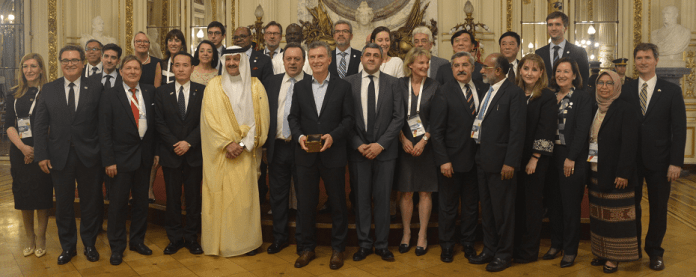
All star line up at WTTC 2018 Summit opening in Buenos Aires, Argentina
The global travel and tourism world is currently at the Hilton Hotel in Buenos Aires, Argentina.
The president of Argentina, H.E. Mauricio Marci personally attended the opening of the World Travel and Tourism Council Summit at the Hilton Hotel in Buenos Aires this morning. He explained the importance Argentina puts into tourism developments, he sees as a massive job creation tool for this South American Country.
The president welcomed the UNWTO initiative announced by UNWTO Secretary-General Zurab Pololikashvilia, to open a tourism innovation center in Argentina. Zurab said later during the opening it would be opened within two months.
The minister of tourism for Argentina H.E. Jose Gustavo Santos echoed the words of his president explaining the beauty and potential of Argentina as a tourism destination.
WTTC CEO Gloria Guevara Manzo reminded attending delegates of the largest travel and tourism corporations that this industry creates 330 million jobs in the world.

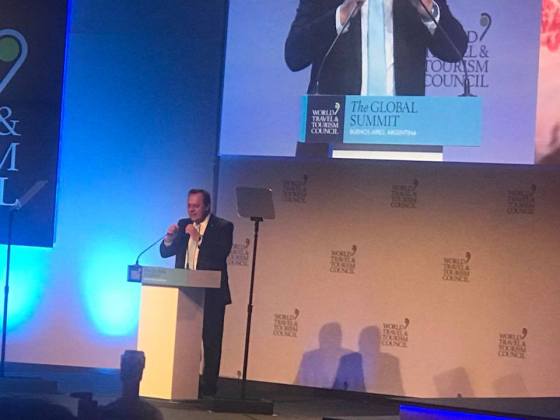

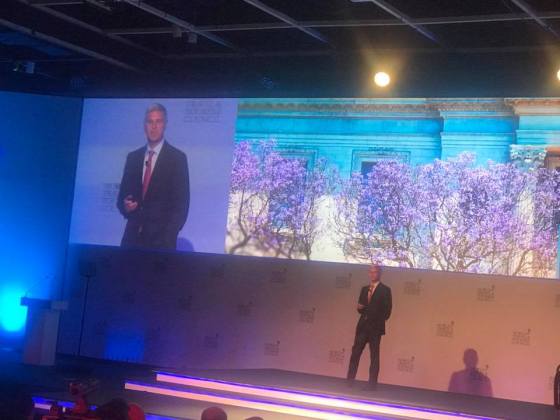
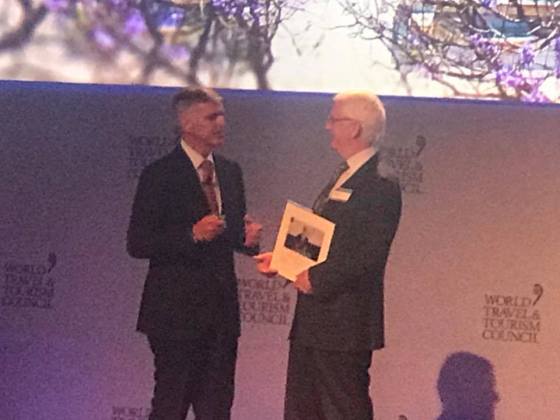
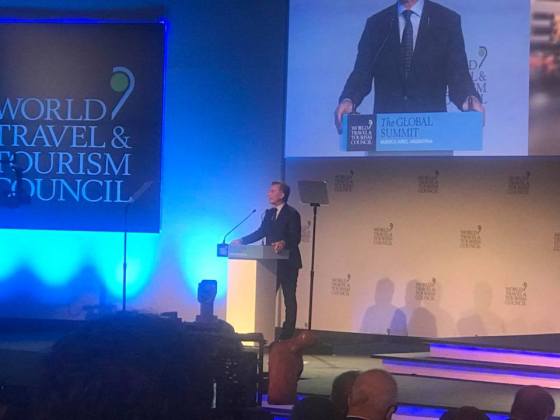 Christopher J. Bassetts, CEO of Hilton Hotels took over the chairman role for WTTC last night and thanked outgoing WTTC chairman G. Lawless.
Christopher J. Bassetts, CEO of Hilton Hotels took over the chairman role for WTTC last night and thanked outgoing WTTC chairman G. Lawless.
UNWTO Secretary-General Zurab Pololikashvilia welcomed ministers from several countries including Bulgaria, Saudi Arabia, Brazil, Kenya, Paraguay and reminded that tourism is an industry of peace and prosperity.
His appeal together with the WTTC CEO was: “Only together we make it better.”
Gloria Guevara Manzo said having competitors work together for the better of tourism is what WTTC is all about.

President Macri of Argentina: First WTTC World Leader for Travel & Tourism
President Maurico Macri of Argentina was today recognised by the World Travel & Tourism Council (WTTC) as its first World Leader for Travel & Tourism. The recognition was announced at the opening ceremony of the 2018 WTTC Global Summit which is taking place on 18 and 19 April in Buenos Aires, Argentina.
The WTTC World Leaders for Travel & Tourism initiative recognises serving Heads of State or Government who have shown exceptional support for the sector during their term of office, both within their own country and at the global level.
Since taking office in 2015, President Macri has championed the Travel & Tourism industry by transforming aviation, investing in infrastructure, and putting in place fiscal policies which support business growth and stability. In his speech to the World Economic Forum in January 2018, President Macri highlighted the economic potential for tourism in Argentina, particularly in the north of the country and where significant investment is planned.
In 2017 in Argentina there were a million more air passengers than in 2016, and hotel occupancies the highest ever. According to WTTC data, last year contribution from the Travel & Tourism sector to Argentina’s GDP grew one and a half times faster than the wider economy, showing how the focus on Travel & Tourism is bringing economic benefits and jobs across Argentina.
Gloria Guevara Manzo, President and CEO of WTTC, commented: “President Macri has demonstrated great commitment to the Travel & Tourism sector and we are proud to recognise the President as our first WTTC world Leader for Travel & Tourism. His clear message of Argentina being ‘open for business’ has benefited tourism enormously. President Macri has set the standard for best practice in global leadership within the Travel & Tourism industry as his policies have facilitated continuous growth and economic development within Argentina. Moreover, his leadership extends to the Presidency of the G20 and we thank him for his support for our sector in that forum. On behalf of WTTC and our members, thank you and congratulations.”

WTTC members investing $1.9 billion for Argentina tourism
Christopher J. Nassetta, Chairman, WTTC and President & CEO, Hilton, announced this morning the investment of $1.9 billion USD in Argentina by WTTC members over the coming years. The announcement was made in front of Mauricio Macri, Argentine President, and more than 100 industry-leading CEOs at the WTTC Annual General Meeting in Buenos Aires, Argentina.
“It’s an honour to be here in Argentina and, speaking on behalf of WTTC’s membership, we could not be more pleased to witness first-hand the benefits of the investment that’s happening here,” said Nassetta. “In total across the country, Travel & Tourism supports 1.8 million jobs today, and we expect to add another 300,000 jobs here over the next decade with our collective investment of nearly $2 billion an important driver of this growth.”
Policies implemented by Argentine President Macri have helped stabilise the economy and his clear message that, after many years of protectionist policies, Argentina is open for business is a positive move for tourism. The substantial investment is a testament to Argentine President Macri’s continued support and commitment to the Travel & Tourism sector.
During a summit among the Tourism Minsters of the G20 economies, yesterday, Argentine President Macri has asked to take his message of support to the G20 World Leaders’ meeting in November.
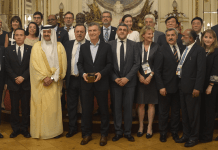
UNWTO joins Tourism Ministers in calling upon G20 Leaders to prioritize tourism
The World Tourism Organization (UNWTO) joined the Ministers of Tourism of the G20 economies meeting in Buenos Aires in calling upon the G20 leaders to consider including tourism in their Agenda for its capacity to create more and better jobs.
In his meeting with the President of Argentina, Mauricio Macri, and current G20 Chair, UNWTO Secretary-General, Zurab Pololikashvili, stressed the capacity of tourism to create jobs and the need to advance the adaptation of the sector to the digital transformation.
The 8th Meeting of the Tourism Ministers of the G20 economies was held in Buenos Aires on 17 April under Argentine’s Presidency of the G20 with a focus on the Future of Work – Tourism’s leading role in sustainable development: a driver for employment.
In line with the priorities of Argentine’s G20 Presidency, which include the ‘Future of Work’, the meeting focused on how tourism can embrace innovation and technology, foster new skills development to create new decent jobs.
“We need to promote the role that tourism has in shaping the future of our world as the sector that will create more jobs in the coming decade” said the Minister of Tourism of Argentina, Gustavo Santos, opening the Meeting.
Ambassador Daniel Raimondi, Vice Minister of Foreign Affairs and Worship of Argentina stressed the future of work as one of Argentine’s G20 priorities and it’s link to tourism, a sector which is key to create jobs, develop infrastructure and exports.
“Let us embrace the technological revolution and unleash its potential to create more and better jobs in our sector, making tourism a true pillar of the G20 objectives of inclusive and sustained growth” said UNWTO Secretary-General, Zurab Pololikashvili, in his opening remarks to the Meeting.
Ministers of Tourism of the G20 economies agreed on considering the following:
– Encouraging policies that promote full and productive employment and facilitate the progress of innovation in tourism and foster the creation of decent jobs, sustainable enterprises and entrepreneurship, in particular among women and the youth;
– Establishing favourable frameworks to stimulate innovation, entrepreneurship and connect ecosystems linking start-ups, main companies, investors and governments along the tourism value chain;
– Creating cooperation mechanisms between educational institutions at all levels, the private sector, governments and technology partners to review educational programmes and skills development policies
– Considering the importance of SMEs in the tourism, heritage and cultural sectors due to their contribution to job creation as well as their role in preserving and promoting cultural resources;
– Promoting the use of digital technology to facilitate travel as well as involving technology stakeholders in national tourism policies
In 2016, G20 countries received 904 million international tourist arrivals, which generated over US$ 1 trillion or 6.3% of all G20 exports.
The Government of Japan will host the 9th Meeting of the Tourism Ministers of the G20 economies in Kutchan Town, Hokkaido in 2019.

Jamaica Tourism Minister: Global mainstreaming of small and medium-sized tourism enterprises
The Minister of Tourism for Jamaica, Hon. Edmund Bartlett, CD, MP, is attending the World Travel & Tourism Council (WTTC) Global Summit 2018 in Buenos Aires, Argentina, which is set to begin tomorrow on April 18. Preceding the opening, he attended a T20 “Meeting of Tourism Ministers” at which he submitted a policy brief on Global mainstreaming of small and medium-sized tourism enterprises. The support received was overwhelming. Here eTurboNews shares the brief in full:
Background
This paper seeks to bring attention to an often under-discussed element of our tourism product- the importance of micro, small and medium-sized tourism enterprises (SMTEs) to the sustenance and vitality of the sector. The time has come for us to seriously revisit our strategies for supporting the expansion and improvement of this critical sector of the tourism market. We are well aware that one of the recurrent concerns among many Jamaicans is that the tourism sector does not sufficiently support sustainable development and that there is negligible reinvestment of tourism profits into the domestic economy.
While the benefits and positive contributions of the tourism sector are well-documented and self-evident, there is an emerging global view in many parts of the world that the tourism sector has not maximized its potential to fully contribute to sustainable development. This is due to heavy reliance on foreign imports within the sector, high rates of leakage, insufficient linkages with other segments of the economy and the belief that tourism revenues remain heavily concentrated within the country’s major hotels, especially through the expansion of the all-inclusive concept. I accept the general implications of these views and, through this paper, I am committed to changing this perception by placing greater emphasis on the role of small and medium-sized tourism enterprises (SMTEs) in promoting our tourism growth agenda.
For the purpose of this paper SMTEs can be defined as a collection of services and goods providers supporting the country’s tourism sector. A micro enterprise is defined as an enterprise having an annual turnover of less than US$100,000 with 1-3 employees. A small enterprise, on the other hand, is defined as an enterprise with an annual turnover between US$100,000 and US$500,000 with 4-10 employees while a medium-sized enterprise is an enterprise with an annual turnover between US$500,000 and US$2,000,000 with 11- 50 employees.
Contribution
SMTEs contribute invaluably to tourism development in Jamaica. Jamaica’s tourism sector is dominated by a vast network of small and medium-sized tourism enterprises (SMTEs) including: artisans and craft vendors, attractions and tours, transportation, beauty shops and textiles, duty-free stores, restaurants and eateries, bed and breakfasts, guest houses, farmers and distributors of hotel supplies. The vast network of SMTEs constitute the backbone of the sector, contributing significantly to the authenticity and quality of the tourism experience, enhancing destination competitiveness and contributing to enhanced brand image, the forging of positive local networks and increased productivity.
These enterprises are recognized as important drivers of economic growth and development in Jamaica by creating employment, facilitating wealth creation and forming the backbone for private sector growth and expansion. The activities of SMTEs also create a value chain within the communities and environs of their operations.
Community-based tourism enterprises (CBTEs), for example, pursue sustainable tourism and return economic, cultural, social and environment benefits to the communities in which they operate, either in whole or through joint ventures. They promote the local tourism value chain through linkages, where appropriate, to agriculture, arts and crafts, food service and related small businesses in the communities. Many are also involved in various forms of community outreach.
Many small enterprises in the accommodation sector are already involved in arrangements in which local farmers and community providers supply inputs for food and beverage, entertainment, furnishings and general hotel operations.
Globally, SMTEs account for most of the indirect jobs created through tourism-related activities. They generate employment, income opportunities and wealth by providing a wide array of oftentimes unique and authentic goods, services and experiences for visitors and by supplying many categories of good and services to hotels, especially during peak seasons, such as fruits and vegetables, meat and poultry, handicrafts, chemicals, other hotel supplies.
Cultural and heritage tourism
SMTEs are also the main drivers of cultural/heritage tourism. International tourism trends are pointing to a shift from the traditional ‘sun, sea and sand’ phenomenon towards interactive experiential tourism, one of tourism’s fastest growing sub-sectors, appealing to markets interested in gastronomy, nature, heritage and cultural experiences in the destinations they choose. SMTEs promote cultural/heritage tourism by assuring visitors of an authentic experience. They facilitate the consumption of indigenous cultures through the promotion of a wide range of activities such
as botanical gardens, marine and safari tours, adventure tours, waterfalls, caves, indigenous sites/villages, museums and galleries, archaeological sites, cabins and huts, local restaurants and live music experiences.
SMTEs facilitate unique gastronomic experiences and indulgence in authentic and vibrant folk forms, art and craft and musical heritage. They also stage appealing community festivals and events that showcase local cuisine and agriculture and the heritage of diverse ethnic, social and religious groups.
SMTEs and tourism growth agenda
As we move to fulfill our mandate to reposition tourism as the catalyst of job creation and inclusive growth for all, we believe that there is significant scope for the expansion of the SMTE sector which will allow for more average citizens to capitalize on the vast opportunities for supplying inputs to tourism entities catering to the visitor experience in areas such as accommodations, restaurants, cultural and creative enterprises, entertainment, attractions and tours, agriculture, manufacturing, foreign exchange trading, duty-free shopping and other services.
The involvement of small and medium-sized tourism enterprises (SMTEs) and community-based tourism enterprises (CBTEs) should be encouraged as much as possible. They should be encouraged to take advantage of the competitive strengths of small enterprises e.g. in meeting niche markets and specialized goods and services as exists in food and beverage and creative industries.
In many countries, the long-term structural issues of productive capacity and competitiveness of domestic industries require strategies to improve competitiveness such as identifying suitable niche markets, technology adaptation and innovations, compliance with international standards, reduction and control of production costs and improving marketing information and distribution networks (e.g. through inter-industry consultations, buyer-seller meetings, trade promotion events and expos).
A closer look at our strategic vision for the growth of the tourism sector over the next five years will reveal that the growth of SMTEs will support several of our key objectives such as: strengthening linkages with other sectors of the economy, particularly the agricultural and
manufacturing sectors; strengthening the benefits derived from the industry by local residents and communities; promoting broader participation by all Jamaicans; and ensuring the safety, security and sustainability of the natural and built environments.
Indeed our reinvigorated support for SMTEs is aligned with our broader thrust of strengthening current tourism linkages and identifying new areas of potential linkages with a view to maximizing the potential of the tourism sector for generating sustainable economic livelihoods for a larger number of locals, particularly those residing in communities in and around resort areas. In order for SMTEs to maximize their full potential, we recognize that they will need our help to build their capacities to meet the demands.
Strategies and initiatives
We have already identified the main challenges facing SMTEs such as: high level of informality, lack of commercial orientation, lack of market information and market access, insufficient access to capital for upgrading, limited customer training and low ICT diffusion. In Jamaica, the work of some of our agencies, particularly the Tourism Linkages Network has been helping SMTEs to overcome some of these challenges.
The Tourism Linkages Network for example continues to strengthen and encourage vibrant linkages through a number of initiatives focusing primarily on human capacity-building, assisting micro, small and medium-sized enterprises with their development, greater integration of local products and services into the tourism product and expanding the country’s potential to tap into new segments of the tourism market. This is evident in the establishment of five networks (Gastronomy, Sports & Entertainment, Health & Wellness, Knowledge and Shopping) to diversify the tourism product; to stimulate increased consumption of local goods; to stimulate entrepreneurship and employment; and to generate and retain more of the country’s tourism earnings. We have sought to improve the domestic credit environment for SMTEs through our 1 Billion JMD revolving loan scheme for tourism enterprises.
In 2016, we also initiated the National Community Tourism Portal. This portal has become an excellent marketing tool designed to help local community-based tourism enterprises (CBTEs) keep pace with the competition by: building awareness of community tourism in Jamaica;
providing comprehensive and engaging information on Jamaica’s community tourism product; providing an easy means for making community tourism bookings; and providing CBTEs with affordable and cost effective e-marketing services. The Tourism Product Development Company (TPDCo) also conducts tourism awareness activities and provides technical assistance on ecotourism, Bed & Breakfast (B&B), agro-tourism, cultural heritage tourism, and arts and crafts development projects.
The potential of the craft industry as a driver for growth in the earnings from tourism has long been acknowledged, in spite of its largely informal structure and other challenges to structured development. Five artisan villages are slated to be built across the island. They will be one-stop-shop facilities where visitors can see the creation and merchandising of craft items, while enjoying authentic Jamaican entertainment and leisure activities. It will also provide an avenue for Jamaican artists and craftsmen to expose and express their creativity by producing unique indigenous items, thus, limiting the volume of imported craft items that are being sold in the industry.
Conclusion
In closing, Jamaica’s experience demonstrates not only the importance of the SMTEs but also what mechanisms can be used to allow this sector to reach their full potential. Through this paper, we call for a more substantive focus on this sector as a means of achieving the United Nation’s Sustainable Development Goals (SDGs). We call for dialogue and a deeper engagement among stakeholders to develop strategies and policies to expand and possibly mainstream SMTEs. Through this forum, we call for a conversation between and among stakeholders to conceptualize, strategize and, to develop a blueprint that will provide guidance to SMTEs globally. Jamaica is in the process of organizing a summit on SMTEs and the SDGs. We will provide you with some more details on this event in the coming weeks.
